Rachel Neumeier's Blog, page 124
September 30, 2021
Bureaucracy is the Worst
No, not that kind of bureaucracy. Or that too, sure, but at the moment, I mean the word “bureaucracy.”
Here’s a post at Kill Zone Blog: Glitches Happen
I’m forever typing thing instead of think. And I’m constantly leaving out question marks.
Then, there are the words you can’t remember to spell—and even worse when you’re so far off the Spell Checker has no suggestions. For me, it’s bureaucrat and all its variations.
I laughed. I can never get “bureaucrat” or its variations right the first time. I have to poke at it till I either get it right or get it close enough that spellcheck figures out what I mean and fixes it for me.
“Lieutenant” used to be just as bad, and still is if I think about it while I type it, as I just did. But I’ve typed that one so often that usually my fingers can get it right without my brain being involved.
I never, or hardly ever, leave out question marks. That one seems odd. But I can’t type “an” without sticking a “d” on the end. I’m continually removing the extra “d.” The same with “ever.” I can’t type it without putting a “y” on the end.
It’s not so much that I type “think” instead of “thing,” but somehow I’m always hitting the “k” at random moments when I reach for any letter over on that side of the keyboard, so extraneous “ks” appear everywhere. That doesn’t happen with any other letter. Just “k.”
And, as I’ve definitely mentioned before, if I’m tired (and, it seems to me, increasingly when I’m not tired), I often type homonyms. I can’t even tell you how often my fingers type “right” instead of “write” and vice versa. It seems to happen a LOT. Like “an(d)”, I generally notice this particular error at once. I don’t think it ever makes it to the draft any beta reader ever sees.
Near-homonyms are just as common, and they don’t have to be all that near, either. Five minutes ago, I typed “time” instead of “type” three paragraphs up in this very post, and only noticed when proofreading the post before hitting publish. Don’t ask me. Four letters, starts with a “t,” has an “i” sound, apparently those characteristics were enough for my fingers to produce the wrong word.
That’s why I TRY to take the time to proofread every post and every Quora answer and every tweet and so on, every single time. I know sometimes typos slip through. But I bet I get 49 out of 50, even in social media, where I don’t care that much.
I sure do wish the back of my brain had more sense about homonyms, though.
Please Feel Free to Share:






The post Bureaucracy is the Worst appeared first on Rachel Neumeier.

September 28, 2021
The SI unit for cuteness
Here we go, a truly *important* topic, from Ben Orlin at Math With Bad Drawings:
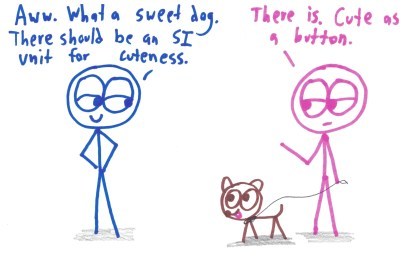
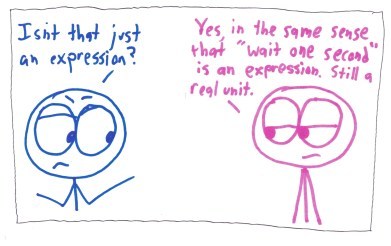
Ben declares that the smaller the unit, the cuter the critter:
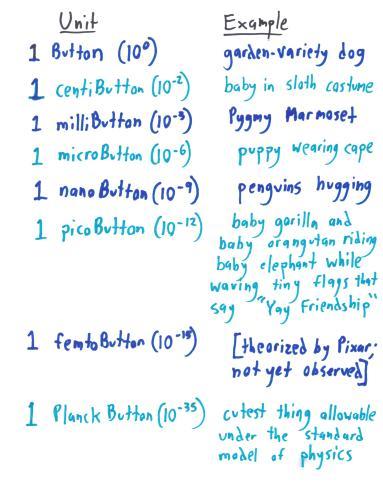
If you skipped past the above picture, go back and make sure you read the example for something that is one picoButton of cute. And click through; there are also examples for non-cute at the link.
Since Ben failed to provide an example for the femtoButton, I’ll step up:
 Dora, Anara Adornment RN RA CRN CRA CGC, fourteen years ago.
Dora, Anara Adornment RN RA CRN CRA CGC, fourteen years ago.I just this morning purchased steps so Dora will have an easier time getting on the couch. (That means I’ll have steps to the windowsill, the bed, the top of the crate where a popular dog bed is available, AND the couch).
Dora’s still cute, but not in the same way.
 Please Feel Free to Share:
Please Feel Free to Share:







The post The SI unit for cuteness appeared first on Rachel Neumeier.

A New Step Into Self-Publishing
New for me, I mean.
I’ve joined Book View Café, and over the next year or so, I’ll be bringing some of my books out through BVC, starting with the Death’s Lady trilogy.
I’ll bring out the Black Dog books over at BVC too, and most likely everything else, EXCEPT maybe not the Tuyo series.
In order to bring out books through anyone but Amazon, the title has to be withdrawn from Kindle Unlimited. That’s fine for readers who don’t particularly care for Amazon. But at the moment, KU is bringing in a third to half my royalties — and Tuyo and Tarashana between them get as many pages read as everything else put together. So I’m reluctant to pull those books out of KU and will drag my feet for a good while before doing so.
Things I’ve learned: a lot about formatting ebooks. I thought I knew everything about using Word. Turns out I didn’t know anything at all about using Styles to format a document. Now I know a lot more about that.
I’ve also copy-edited a few books for other people, which in one case means I’m planning to point you to the book once it’s out because it’s an interesting book and I loved a lot about it.
I expect I’ll be doing an occasional guest post over at BVC too.
Please Feel Free to Share:






The post A New Step Into Self-Publishing appeared first on Rachel Neumeier.

September 27, 2021
What Reading Looks Like to An Author
An post at Book Riot: WHAT READING LOOKS LIKE WHEN YOU’RE A FULL-TIME AUTHOR
As always, this will vary (A LOT) by person.
I mean, I know an author — not sure if she’s full-time, but it doesn’t matter, this stuff applies to all authors — she told me she has become far less tolerant of sentence-level problems and can no longer stand to read most books. I remember this conversation because, thinking about this at the time, I realized the same is not true for me. I’m happy to say that I still can and do enjoy a broad range of books, including some that aren’t that great at the sentence level, depending on what else is done well in that book.
Anyway, let’s take a look: Ways reading changes when you become an author:
1) READING CAN BE A CHORE
Okay, that is occasionally true. Only very occasionally. If I’ve been asked to blurb a book and I’m not in the mood to read it, but I have to read it, then reading that book can be a chore (very unfair to the book in question, so I try not to agree to read a book unless I genuinely expect to like it).
If I’ve agreed to copyedit a manuscript for someone, that’s a chore. I’ve done that a few times. It’s nice when I love the book, less nice when that isn’t the case. In both cases, it’s something that needs to get done, and something that takes time that could go to my own writing or to reading a book off my TBR piles.
Or! When I’ve agreed to be on a panel at a convention and in order to prepare, I feel like I have to read several books. That’s definitely a chore! I definitely approach the book with a dour “Go ahead, impress me” attitude that is otherwise not really how I feel when I pick up a book. This is also not fair to a book, but there it is.
But these sorts of things don’t come up all that often.
The author of the linked post does have this kind of thing in mind, but she also says — “Stepping away from your own books to read more books can feel like such a chore. Especially when you’re reading books in genres that you write.”
Now, that’s a place where she might have typed I instead of you. That’s just her. I never feel like reading something I want to read is a chore. If I felt like that, I wouldn’t read it. I would read something else, something that did not feel like any kind of chore. Reading slump? Total lack of enthusiasm for everything on my TBR pile? I’d re-read something I love OR I’d break out a new Ilona Andrews or something like that, something by an author who can always get me out of a slump.
2) READING STOPS BEING A REPRIEVE
Wait. Does she mean reprieve? Or does she mean refuge? From the way she’s using this word in this section, I think she means refuse.
Without pausing here for a diatribe, I will just say that the author using possibly related but wrong words is one of the sentence-level problems that will cause me to instantly DNF a book — much more so than various other deficiencies.
3) READING IS PART OF THE JOB
Isn’t that basically the same as “a chore?” Well, maybe not. Maybe this means “approaching reading with a businesslike attitude, but also with pleasure.” That would be the way to approach tasks required by a job one likes, as opposed to chores, which by definition are something you have to do whether you like them or not. Still, those categories — chore, job — look very similar to me. She mentions here reading books for research and reading books because you’re on that panel. That’s fine. Let’s say reading a book you turn out to dislike because for whatever reason you’re obligated to read it — chore. Reading a book you like, but that you’re reading because you’re obligated to read it — a job.
I’m somewhat stunned that this post doesn’t ever say:
4) NOT NEARLY AS MUCH TIME FOR READING
The problem with being an author is that you ALWAYS have something you should be / something you ought to be working on yourself. All the time. (Should I be saying “you” here? I must say, I feel this is an absolutely universal state for authors. But no doubt some lucky authors are immune to the guilty feeling, every time they sit down with someone else’s book, that they OUGHT to be working on their own book.
Anyway, for me, the big changes in reading I’ve discovered over the past twenty-odd years are:
–Not nearly as much time for reading, and
–A greatly enhanced awareness of sentence-level craft when reading other people’s work, and
–Also an enhanced awareness of scene- and story-level craft, but not as much as at the level of sentences.
These days, I frequently pause to re-read a particularly nice sentence or paragraph or scene. I mean, all the time. I greatly enjoy the greater awareness of excellent sentence-level writing. That’s something I consider a definite positive change.
Please Feel Free to Share:






The post What Reading Looks Like to An Author appeared first on Rachel Neumeier.

Menewood by Nicola Griffith
No, it’s not out yet. Looks like the publication date got pushed back from November of this year to 2023 — I wonder if part of that (or how much of that) is due to the supply chain problems? I’ve been seeing announcements of other books’ release dates being postponed.
But that’s not what I want to comment on.
The thing is, I was poking around, looking to see if Menewood was scheduled for release — for that matter, whether it might’ve been released and I missed it — and you know what, this book has nine ratings on Goodreads. None with a review. Just ratings.
What causes that? If someone had an advance copy, wouldn’t they write an actual review? I’ve seen that, and that’s fine, but just a rating with no review? I don’t think any of these people can have read it. What gives? Are these fake people? Nicola Griffith fans who hope they’ll love the book? But two of the reviews are four stars, not five, so … what, they hope they’ll like the book pretty well but are sure they won’t love it?
I realize this happens a lot. Unpublished books that are up on Goodreads always get ratings, sometimes quite a few ratings. It’s just weird.
Please Feel Free to Share:






The post Menewood by Nicola Griffith appeared first on Rachel Neumeier.

September 24, 2021
Comparison is the Thief of Joy
From Kristine Kathryn Rusch’s blog: Comparison is the Thief of Joy
This is not (I realize) a new thought. But wow, is it true.
Kristine begins by telling a personal story. I will add: I would never in a million years audition for any form of performance role. Being an instructor in front of a classroom full of students is fine. Being a panelist at a convention is fine. Performance in a role, no way, not fine in the least.
Of course, the basic idea — that comparing yourself to others is not a happy path — is true regardless. She says:
The writers I’ve been around, particularly those with some success, often compare themselves to others like this: I’m more talented than XYZ Bestselling writer. How come he has all the luck? And then they try to explain it to themselves, often with a result like this:
Oh, he’s successful because he dumbs his work down for the masses. … Or, he’s successful because he sucks up to everyone in power (in traditional publishing).
He’s never successful because of his abilities—not to that person. Not that it matters, either. In the arts, comparing two artists isn’t fair. They’re different. They’re on different paths.
This is indeed an insidious frame of mind. This is true whether you tend to be envious of other people’s supposedly undeserved success or envious of their acknowledged skills and simultaneously self-denigrating regarding your own. The latter isn’t as bad — it’s not mean-spirited — but it’s not helpful.
Long post, but here’s Kristine’s basic conclusion:
I know a lot of you have that problem. Most of you compare and find something wanting in yourself or you figure that the other person (persons?) cheated somehow and that’s why they’re doing better. The problem isn’t that they’re doing better (which might be a perception thing) or because they’re more talented or because they try harder. The problem is that you’re comparing. …
We don’t have enough joy in our lives … Enjoy what you can do. As an artist, you are unique. Your skills are yours alone. Comparing them to someone else’s is a waste of time and a waste of your precious abilities.
Please Feel Free to Share:






The post Comparison is the Thief of Joy appeared first on Rachel Neumeier.

September 23, 2021
SF Cops
Here’s a sample of the books I’m taking a look at so that I’ll hopefully be able to contribute to the Archon panel on space cops.
Arora Rising by Alistair Reynolds
Thalia Ng felt her weight increasing as the elevator sped down the spoke from the habitat’s docking hub. She allowed herself to drift to the floor, trying to judge the point at which the apparent force reached one standard gee. Thalia hoped this was not one of those habitats that insisted on puritanically high gravity, as if it was somehow morally improving to stagger around under two gees. Her belt, with her whiphound and polling-core-analysis tools, already weighed heavily on her hips.
I gather from chapter one of this book that a whiphound is a terrifying weapon prefects use when imposing draconian sentences on habitats without any warning.
The prefects are presented as the good guys. This is not, as far as I can tell, being presented as a dystopia. After reading the first couple of chapters, my reaction is: Sorry, but saying, “We’re totally defending democracy via draconian penalties inflicted on large numbers of innocent people without any warning” does not make your actions seem right to me.
The whiphounds do, however, fall into the category of “cool equipment.” They seem to be weapons with enough of an AI component to act more or less independently. If someone attacks a prefect, they cut pieces off that person to neutralize the threat.
Personally, I don’t find this at all realistic. It seems to me that someone could grab a relatively low-tech gun and shoot a prefect before a whiphound could be deployed. The weapon apparently has to be told what to do before becoming active, and while it may be able to strike across twelve feet or so, you know what can strike across a much greater distance than that? A gun.
There’s a long prologue, which I’m skipping for now. Just looking at the level of tech, I’m seeing containment suits and pulse rifles — very ordinary sorts of things. Then the first chapter opens this way:
“That’s an officer’s tail, ain’t it?”
Lieutenant Michael Brogue, dressed in camouflage fatigues the color of a Terran desert, stood in the center of a wide cavern, surrounded by old-style arc lamps, fifty or more unmarked crates, a dozen terrified hostages, six desperate Freedomists, and an antique holdheld chemically propelled projectile weapon pointed directly at the bridge of his nose.
The man addressing him appeared to be about twenty-five years old, a native Martian. He was dressed in a sleeveless blue tunic and loose-fitting bright red trousers, the cuffs of which had been sloppily shoved into a pair of heavy workman’s boots — probably in an attempt to appear “military.” He was currently being called a “terrorist” by the Martian media and a “freedom fighter” by his small circle of compatriots.
An officer’s tail?
Do you generally think about the guy’s outfit in detail when he’s pointing a gun at your face? Well, fine, moving on.
Great North Road by Peter Hamilton
Oh, this one opens with a different kind of prologue — a timeline from 2003 to 2121. I actually like that a lot better than most ordinary prologues. The story itself opens in 2143.
As midnight approached, the wild neon colors of the borealis storm came shimmering through the soft snow falling gently across Newcastle-Upon-Tyne. It was as if nature were partying along with the rest of the city, providing a jade-and-carmine light show far more elegant than any of the fireworks that had been bursting sporadically above the rooftops since Friday.
Detective Third Grade Sidney Hurst watched batches of light-night revelers staggering along the frozen pavement, calling out greetings or challenges depending on how toxed up they were. Ice, snow, and slush played havoc with the smartdust embedded in the tarmac, blacking out whole sections of the metamesh that governed the city’s roads and therefore making driving with the vehicles smartauto a dangerous gamble.
A far more appealing opening than the one above, and not only that, but tons of equipment. Not cop-specific equipment, but a lot more interesting than pulse rifles. Let me see. Looks like the there’s “bodymesh” with “smartcells” that appear to be like a cooler, more advanced version of a smartphone. Connection and identification and who knows what else. I’m moving this up the list to actually read it before Archon.
Ma rooned in Realtime by Vernor Vinge
On the day of the big rescue, Wil Brierson took a walk on the beach. Surely this was one afternoon when it would be totally empty. The sky was clear, but the usual sea mist kept visibility to a few kilometers. The beach, the low dunes, the sea — all were closed in by faint haze that seemed centered on his viewpoint. Wil moped along just beyond the waves, where the water soaked the sand flat and cool. His ninety-kilo tread left perfect barefoot images trailing behind. Wil ignored the sea birds that skirled about. …
It goes on like that. I’m not too interested. “Moped” is not a word that draws me toward this protagonist. I don’t mind establishing the setting, but the first glimpses of this guy’s attitude turn me off. I’m bored by him and his mopey attitude and the way he ignores the birds. Having said that, I respect Vernor Vinge a lot as a writer and would go on with this purely on that basis.
Skimming ahead, I see that a remote-controlled flier turns up a few pages on. That’s the first sign of SF-esque technology. Oh, and here’s an alien. Vinge’s Tines were one of my favorite-ever alien species.
Lije Baley had just reached his desk when he became aware of R Sammy watching him expectantly.
The dour lines of his long face hardened. “What do you want?”
“The boss wants you, Lije. Right away. Soon as you come in.”
“All right.”
R Sammy stood there blankly.
Baley said, “I said, all right. Go away!”
R Sammy turned on his heel and left to go about his duties. Baley wondered irritably why those same duties couldn’t be done by a man.
R Sammy is a robot, of course. I have never much liked Asimov’s books. I’ll take a look at this, but I don’t offhand expect to really like this one either. That may not be fair. Apparently the protagonist gets to know the robot and his opinion changes and so this is really sociological SF, which often appeals to me.
“I have decided to consider it all just a terrible mistake,” I told my integrator. “and the best thing to do is to simply ignore it and get on with my life.”
The integrator looked at me with large and lambent eyes. It had been eating its way through yet another bowl of expensive fruit and did not pause in its chewing as it said, “That may be difficult to do.”
Its voice came, as always, from some indefinite point in the air. It occurred to me, and not for the first time, to wonder how it contrived to still speak in that manner. A few days before I could have drawn a schematic to show exactly how its collection of interconnected components worked. I had, after all, assembled and disposed them in various locations about my workroom, so that I would have a research and communications assistant equipped with all the appropriate skills and systems that a freelance discriminator required….
I like this a lot better than the previous one. They both open with dialogue, but this one is a lot more lively and interesting and fun. A LOT more.
I’m moving this one and Great North Road to the top of the pile for actually reading the sample. Then Vinge. Then we’ll see. But Phobos is at the bottom of the pile at the moment.
Please Feel Free to Share:






The post SF Cops appeared first on Rachel Neumeier.

What it takes to be an editor
Here’s an interesting post at Jane Friedman’s blog: What It Takes to Be a Freelance Editor
I don’t think I would be a particularly good editor. Copy editor or proofreader, yes. Other things, maybe? Sometimes it’s easy to offer important advice about the structure of a book, but surprisingly (?) often, I find myself saying, “This book didn’t really work for me, for some reason.” That’s not especially helpful.
I’ve worked with some really good editors. I’m curious about what the author of this post, whom I presume is an editor, has in mind for “what it takes.”
You love reading, right? And you’re really good with grammar and spelling. Maybe you even have an English degree or an MFA. What else do you need?
Curiosity, education, and ruthlessness.
Hmm.
I think it does help to know stuff. That’s for copyediting — which I think of as “Proofreading plus factual errors plus continuity errors plus anything that seems iffy.” I’m not sure if everyone more or less treats the term that way. But if that’s what copyediting includes, I’m not sure I would say “education” is helpful, exactly. I would say “knowing lots of random stuff” is helpful.
Let me go back to the post …
Yes, “knowing lots of random stuff” is pretty much what the author means by “curiosity.
By education, she means “knowing stuff about current trends in publishing and about currently available editing tools.” I guess that could be helpful, though it’s very different from the sorts of things you need to know to suggest story-level changes to a manuscript.
Ruthlessness:
No matter how beautiful the writing is, if a sentence doesn’t fit the character or the story, it’s gotta go.
I would prefer to say, If the sentence or scene is beautiful, perhaps think about how to make it fit the character and the story so that you can keep it.
Many early-career authors use their elevated Special Writer Voice, and their editors must challenge them not to make their words “better” or “more polished,” but more truthful to the author’s own voice.
Yes, but maybe it would be nice if their very own author’s voice was also skillful and perhaps polished?
Purely nurturing feedback is unhelpful. Straight criticism is discouraging. An editor must identify what’s wrong, clarify why it must be fixed, and excite the author to do the work. Editors must inflict the pain of “It’s not good enough, yet.” I’ve told more than one author to cut their first 50 pages. That’s painful! What I say about their work must ring so true that they trust me enough to endure that pain, for the sake of a better next draft.
And that paragraph finally strikes me as true. I don’t have any quibbles with that.
A helpful post, considering the upcoming Archon panel on editing and Lines You Won’t Cross and so on. If the editor has done the above — pointed to something wrong, clarified what’s wrong with it, hopefully in a way that makes the author want to fix that problem — most of all, if what the editor says immediately rings true — then she’s done a fine job as editor.
My first reaction to a lot of comments in a lot of editorial letters has been: OF COURSE! WHY DIDN’T I SEE THAT?
That’s pretty much an ideal reaction to editorial comments. It means the editor truly succeeded in nailing a problem and clarifying why it’s a problem and perhaps what to do to fix it.
Please Feel Free to Share:






The post What it takes to be an editor appeared first on Rachel Neumeier.

September 22, 2021
Archon Panels
So, as I mentioned a day or so ago, I’ll be attending Archon this year. I don’t expect a big convention — I doubt the masquerade will be anything much, for example, and usually this is a heck of a convention for the masquerade. However, we shall see!
I’m on seven panels. I’m moderating three, which means a little more preparation may be desirable. In one case, “a little more preparation” gave me an excuse to be a touch self-indulgent — more about that below.
So, the panels:
Friday:Writing Older Characters
Not every character is a spring chicken!
I imagine this will be an easy panel. Everyone no doubt has a list of their favorite older characters to mention, for one thing. Certainly I do.
My first thought was: Have I actually ever written an older character? Isn’t that a trope I like but have so far not written myself?
Then I thought, No, that’s older female characters. I’ve actually written a good handful of older male characters — how many depends on what you consider “older.” (My opinion of what seems “older” has definitely changed over the past decade.)
There’s Gereint — he’s forty-one — and Beguchren — unspecified, but much older than that — from The Land of Burning Sands. Then Aras, who is early fifties — not as old for a Lau as for me, granted. And even more recently, Daniel, who is also in his fifties somewhere. (That really does not seem old to me any more.) So, honestly, that’s plenty of older protagonists and near-protagonists.
I still do want to write an older female character, though. Someone like Maskelle, an older woman at the height of her power — granted that Maskelle has met certain reverses , but still. Or perhaps I’d like to write someone older than that, like in her seventies, something like that. Tenai doesn’t count here because she’s not older physically.
Saturday:The Starting Point
“Ideas are easy, writing is hard.” How do you choose which ideas are worth pursuing? How do you decide when an idea just isn’t working and move on to something else? What if you’ve already taken an advance?
This panel, I’m moderating, so I came up with a longish list of questions that address this topic. It’s an interesting topic, and I expect everyone on the panel will most likely respond in a unique way, since everyone’s writing process is generally so different. Among other things, I bet that “an idea that isn’t working” means something different for a writer who outlines extensively than it does for me.
Planning The Perfect Murder
You’ve read enough murder mysteries; how would YOU pull off the perfect murder?
The way this panel prompt is written, it’s an easy topic to have fun with. I did copy the link to that fun post … right, here it is: The Only Murdering Murder Guide You’ll Ever Need, You Murderer. I’ll be sharing that for sure. Some of the advice in that post is actually good, too. I’ve occasionally been stunned when reading a true-crime story at how stupid people are when they hire someone else to kill their spouse. Amazingly stupid to hire some lowlife thug you don’t know. Amazingly stupid to involve anybody else period.
Anyway, moving on:
The Space Races
Some stories have mankind becoming more and more homogenous until race is no longer an issue. Others have racial, religious and other groups all heading off to colonize their own ‘home planet.’ Which do we think is more likely, and are there positive aspects to both systems?‘
At first I thought this was supposed to be about the question of whether humanity would become more homogenous or more heterogeneous after leaving Earth and scattering across the galaxy. That would be a pretty silly question, unless you invented mass teleportation, say. However, on second look, that’s not what it says. Increasing homogeneity can be presumed to be happening in a future in which humanity never does leave Earth. That’s not nearly as silly, though I don’t actually think it’s likely either.
Regardless, I will personally be arguing that it’s absolutely inevitable that heterogeneity will increase if and when humans scatter into space. Plain genetic drift would see to that even in the complete absence of (a) the founder effect, (b) selection, or (c) people fiddling around with genetic engineering — all of which would probably also take place simultaneously.
I haven’t yet looked for far-future SF novels in which one or the other outcome is postulated. There’s at least one kid’s SF novel in which the former outcome, increased homogeneity, is postulated, but I don’t remember enough about it to pull title or author out of my head. Mostly I can think of titles postulating increased heterogeneity. We’ll see what the other panelists come up with here.
Editing: My Way or the Highway
You’ve scored a book contract with a major publisher, but they want changes. Editors can’t always be right, can they? Is there a ‘line in the sand’ you just won’t cross?
I’m moderating this one. I’ve broken “changes” into categories: minor, still minor, still fairly minor, major, and really major. I think it should be easy to talk about examples of suggested changes that fall into these categories. I can certainly do so personally, with Mountain being the one that lands in the “really major” category. Can you replace this protagonist with a different protagonist and revamp the plot to make that work? Yeah, pretty sure that counts as “really major.”
And everyone has a line they won’t cross for any given book, surely.
I don’t anticipate any problems with this panel. I think it should be interesting, easy to keep focused on the topic, and packed with opinions.
Sunday:Space Cops
Who are some of the most interesting Science Fiction detectives and lawmen? What crime fighting equipment do we want to see in the future?
I don’t really know how I wound up on this panel. I’m dreading it a bit. I can think of any number of detectives and lawmen I like a lot — in fantasy. Not so much in SF. I can think of ONE — Wrapt in Crystal by Sharon Shinn. If you stretch a point, the latest Murderbot novella is a murder mystery. But that’s it. That’s all I can think of.
I’ve certainly never written any character who falls into this category, except (if you stretch a point) maybe Aras? And that’s fantasy, not SF.
So I went on a fast google search and then picked up samples of half a dozen books featuring detectives and inspectors and agents and so on in SF settings. I feel like I better read at least a couple of them real quick and give this whole “equipment” question some thought.
If any of you immediately thought of a detective or whatever in a SF novel, please point me to that in the comments. Even suggestions of TV shows and movies would be welcome. Robocop is the only one who springs to mind for me.
Rawr: Why Are We So Fascinated with Dinosaurs?
Every small child can tell you that dinosaurs are absolutely amazing. Why are adults so drawn to them as well?
Whew! That is much better!
I mean, this is a fundamentally stupid question: Why are adults so drawn to them as well? The answer is too obvious for words: because dinosaurs are genuinely amazing, that’s why. There’s no need to focus the panel on that question. Instead — I’m moderating, so I’ll be directing the discussion — I’ll start with these two basic questions:
A) Theropods, Sauropods, or Ceratopsians?
B) Got a favorite clade?
Theropods are the familiar lineage of bipedal, largely carnivorous dinosaurs that include Tyrannosaurs (not my favorite) and a whole lot of other dinosaurs including the maniraptorans (my personal favorite).
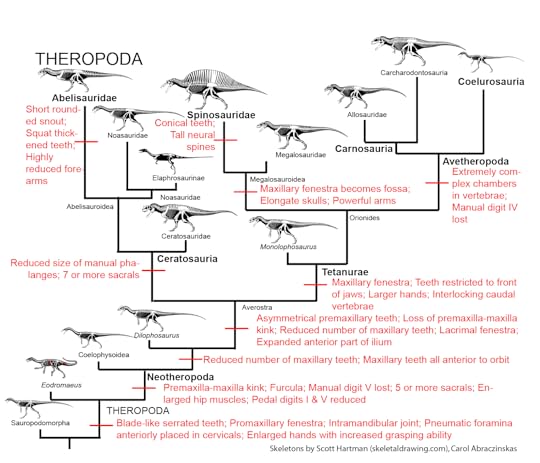 https://www.geol.umd.edu/~tholtz/G104...
https://www.geol.umd.edu/~tholtz/G104...The maniraptorans are a branch of the Coelurosaurids. This snazzy image is from the amazing, extensive set of taxonomic trees produced for the GEOL 104 Dinosaurs: A Natural History class at the University of Maryland, a class that presents THE BEST taxonomic trees of dinosaurs ANYWHERE online. Look at this tree! Look at how clearly the important anatomical details are presented. I can’t imagine going to the U of M and not taking this class. I would have LOVED this class. You can line up one tree after another and trace dinosaurs from Archosauria all the way up to birds — just keep going up the right-hand tip of each taxonomic tree.
The sauropods are of course the big guys. I’m not fundamentally as interested in sauropods as theropods, though sheer size does have its own fascination. I do like ceratopsians — the horned dinosaurs — almost as much as maniraptorans. There are a handful of other big groups, notably the thyreophorans — those are the armored dinosaurs, stegosaurs on one main branch and ankylosaurs on the other. They’re fine, I guess. If your artistic sensibility is inclined toward tanks and rhinos, then no doubt thyreophorans also appeal to you.
Anyway, I used this panel as an excuse to indulge myself. I bought, for show-and-tell at this panel:
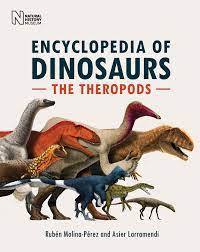
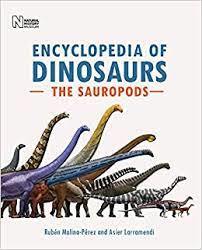
These books are illustrated by Rubén Molina Pérez, who’s wonderful at paleoart. Here’s an example of his artwork from the Theropod book:
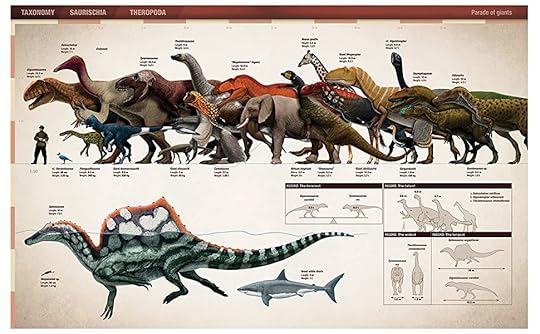
Isn’t that spectacular? Wow, I’m going to love these books!
Also, though unfortunately not for show and tell, this book:
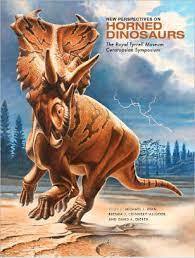
This one is available at Amazon as an ebook for eight bucks or so, and as a paper-edition hardcover for a mere $245. Guess which version I bought. This sounds like a GREAT book. I love the table of contents. It’s a bunch of papers that came out of a relatively recent-ish symposium (about fifteen years ago) on the Ceratopsians. There’s so much here! The book is about a thousand pages.
I also already had this one:
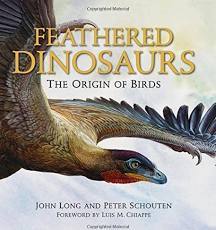
As you can see, I’m looking forward to this panel.
Please Feel Free to Share:






The post Archon Panels appeared first on Rachel Neumeier.

September 21, 2021
Committing the perfect Murder
Here is a fantastic post by Jim Behrle, that starts of with an equally fantastic title: The Only Murdering Murder Guide You’ll Ever Need, You Murderer
First things first: Murder is wrong, OK? But let’s say, hypothetically, that you’re considering committing one anyway: how would you do it? … Maybe you want to murder novelist Jonathan Franzen. Let’s say you do. You want to stand over Jonathan Franzen’s wrecked body as it bubbles over with his own blood. You’re laughing and he’s just kind of lying there, gurgling. You beat him to death with an iPad and now there won’t be any more sprawling family angst novels from Mr. Handsome Fake Genius Man. Maybe that is who you want to murder. Maybe you would really enjoy wringing his skinny Brooklyn neck. His skinny, pretentious, overrated, Brooks Brothers neck. Hypothetically. Here are some things to think about while you’re totally planning the fake murder you have no intention of actually doing and by reading this sentence you hereby absolve the writer of any complicity in the crimes you will in no way go out and commit here comes the period and Jim is absolved.
You should definitely click through and read the whole thing.
I found this post, by the way, because I’ll be going to Archon in two weeks. Proof of vaccination, face mask, the whole deal, but nevertheless, I’m going. I do wonder how big a convention Archon will be this year compared to two years ago. Small, is my guess.
So, anyway, there aren’t a ton of pros attending, so the people running the con said, basically, If you don’t mind carrying a heavy load of panels, we will love you. So I checked off the box for “If you need me on this panel, I’m willing” on a LOT of panels, and therefore wound up on one about committing the perfect murder.
I mean, I’ve never written a mystery and probably never will, but at least I’ve read a lot of mysteries. As one does when reading mysteries, I have developed clear ideas about how I would commit an ideal murder (unrealistic) and how I would actually probably commit a murder (much more realistic).
Nevertheless, no matter how many murder mysteries I have read, I felt a certain amount of research was desirable on this topic. Almost at once, I found the post linked above.
Agreeing to be on this panel was worth it just for this great advice:
Always do it all yourself. The fewer people you include, the fewer people you will have to kill later. If you want to get away with murder, no one else can know about it. Not your mom, not the cat. You should probably avoid even making eye contact with anyone while you’re thinking about the murder. Maybe that person is clairvoyant. You don’t know. The more people who know about your murder the more people you may have to someday murder to keep them quiet. Because they’ll blackmail you and stuff; people are such creeps. And word to the wise: if you build an awesome killer ninja robot to be your accomplice, then you will have to take the whole thing apart after the murder is done and then hide all the bloody pieces. Don’t accumulate witnesses or conspirators. It will only increase your chances of getting caught.
Please Feel Free to Share:






The post Committing the perfect Murder appeared first on Rachel Neumeier.




